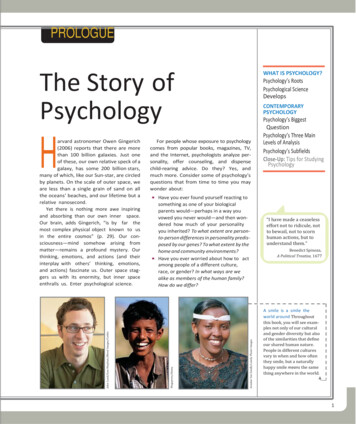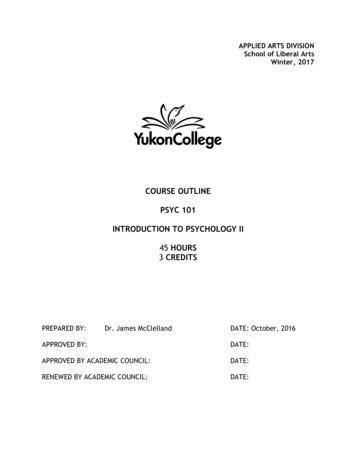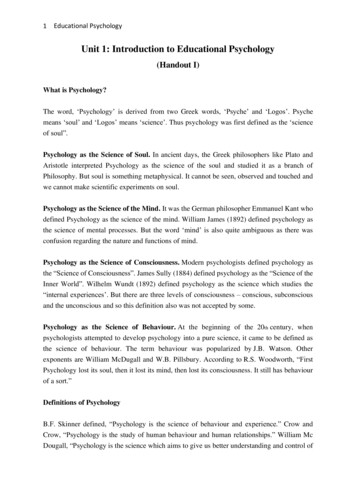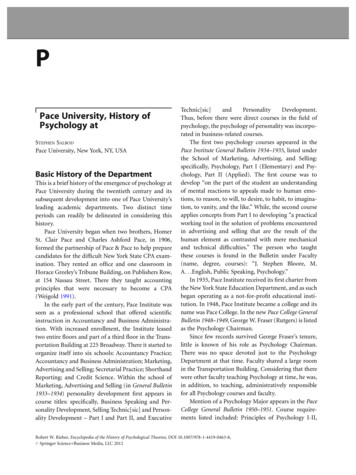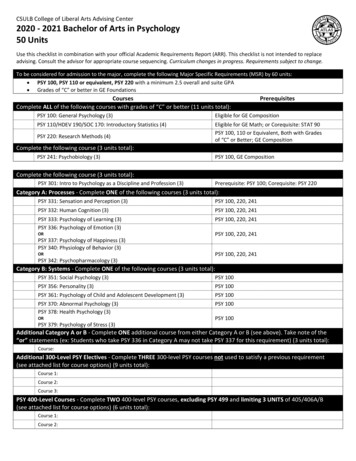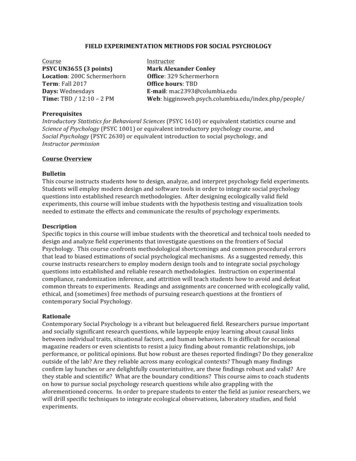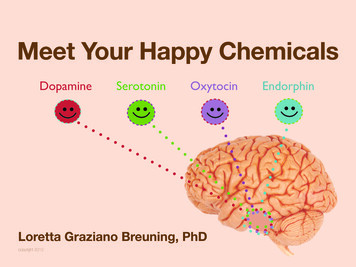
Transcription
Meet Your Happy ChemicalsDopamineSerotoninOxytocinLoretta Graziano Breuning, PhDcopyright 2012Endorphin
When your brain releasesone of these chemicals,you feel ytocincopyright 2012EndorphinLoretta G. Breuning, PhD
It would be nice ifthey surged all the time.MeetYourHappyChemicals.comcopyright 2012Loretta G. Breuning, PhD
But they don’twork that way.Each happy chemical has a special job todo, and it turns off when the job is done.MeetYourHappyChemicals.comcopyright 2012Loretta G. Breuning, PhD
That’s why we’realways looking forways to turn on ourhappy chemicals.MeetYourHappyChemicals.comcopyright 2012Loretta G. Breuning, PhD
When we find somethingthat works,we repeat it.The brain builds a“happy-chemical habit.”MeetYourHappyChemicals.comcopyright 2012Loretta G. Breuning, PhD
Many happy habits havenegative side effects.Unhappiness results.Your brain may react by tryingharder to trigger happy chemicalsin the same old ways.A bad loop.MeetYourHappyChemicals.comcopyright 2012Loretta G. Breuning, PhD
For example:I bet you can think often examples in ten secondsWe each struggle to manage a brainthat seeks happy chemicals in the waysit learned from past experience.MeetYourHappyChemicals.comcopyright 2012Loretta G. Breuning, PhD
The GOOD NEWS IS.You can escape this loop.You can build a new happy habitto substitute for an old one.You can do it in 45 days.MeetYourHappyChemicals.comcopyright 2012Loretta G. Breuning, PhD
The BAD NEWS IS.It’s hard.It won’t feel good for 45 days.It may even feel like your survivalis threatened because your brainequates old happy habits with survival.MeetYourHappyChemicals.comcopyright 2012Loretta G. Breuning, PhD
It’s easier when you knowhow your brain worksThis presentation has 3 brain-savvy tips to help buildnew happy habits with fewer negative side effects.When this presentation is over, choose one oldhappy habit you’d like to replace with a new one.Plan in detail how you will activate a new behaviorfor 45 days while your brain is re-wiring itself.MeetYourHappyChemicals.comcopyright 2012Loretta G. Breuning, PhD
All the informationhere is elaboratedin my new book,Meet Your Happy Chemicals 9.99 2.99on Amazonon KindleMeetYourHappyChemicals.comcopyright 2012Loretta G. Breuning, PhD
3 tips for easier rewiring1. Don’t judge yourself for 45 days.2. Make peace with your unhappy chemicals.3. Choose your new happy habit wisely.MeetYourHappyChemicals.comcopyright 2012Loretta G. Breuning, PhD
Tip #1Don’t judge yourself for 45 daysYour brain needs 45 days of repetitionfor a new habit to start feeling normal.Accept bad feelings for those first 44 daysinstead of letting them change your course.Don’t expand the bad feelings by judgingyourself. Your brain is a complex contraption.MeetYourHappyChemicals.comcopyright 2012Loretta G. Breuning, PhD
ExamplesJane starts eating healthy after years of compulsive snacking.But she doesn’t feel as “great” as she expected. “Maybe thisisn’t for me,” she thinks. She catches herself judging and sticksto her plan. In 45 days, healthy eating feels natural to her.John stops partying and gets serious about his studies. But he hasthe impression that everyone else “gets it” faster than he does. Hefocuses on studying instead of judging, and in 45 days he feels goodabout his new self despite the frustrations of social comparison.Mary and Mel stop fighting and build the habit of calmacceptance. They think it feels “phony” when they control theirtempers. But instead of judging these awkward feelings, theystick to the plan, and in 45 days, calm acceptance feels great!MeetYourHappyChemicals.comcopyright 2012Loretta G. Breuning, PhD
Why is our wiring so quirky?!!!We learn effortlessly in youth, but as you age, newlearning requires repetition.Your happy chemicalsgot wired by things you picked up by accident.Humans are not born pre-programmed with survival skills.We’re born to connect neurons from life experience.Our earliest experiences make connections that ourlater knowledge rests on. By age 2, some of yourneurons have already died, and others have startednetworking. By age 7, your network is big enough torely on. By 21, your neurochemical cake is baked.MeetYourHappyChemicals.comcopyright 2012Loretta G. Breuning, PhD
! ? !? ! ?Your brain equates old learning with survival,even when you learned something unhealthy.There’s no delete button, but you have the power tobuild a new circuit by putting your focus elsewhere.The new circuit must grow big and strong becausethe old circuit will always be there.MeetYourHappyChemicals.comcopyright 2012Loretta G. Breuning, PhD
Tip #2Make peace with unhappy chemicalsUnhappy chemicals are part of your brain’snormal operating system.They alert you to survival threats the wayhappy chemicals alert you to survival boosts.If you run from them, you’ll always be running.You can learn to live with them instead.MeetYourHappyChemicals.comcopyright 2012Loretta G. Breuning, PhD
Why do unhappy chemicals seem to surgewhen you do things that are good for you?They were there all along but you were masking themwith a happy habit.Unhappy chemicals are always trying to protect youby finding potential harm and sounding a warning.They feel bad because that works: it gets your attention.MeetYourHappyChemicals.comcopyright 2012Loretta G. Breuning, PhD
Examplesa smokerJoe started smoking because it helped him feel safe in uncomfortable situations. Hestopped smoking and his unsafe feelings grew. His brain needs time to build a newsafety habit. He tried donuts, but saw the down side. So he tried just noticing histhreatened feelings, and reminding himself of his own triumphs. In 45 days, that newhabit felt as safe as a cigarette once did, even though the world is not actually safer.a spenderShopping made Sue feel important, and as soon as she stuck to her budget, her oldunworthy feelings kept creeping up. Manipulating people helped her feel importantagain, but she realized that has bad side effects too. Instead, Sue started acceptingher natural urge for importance, and its inevitable ups and downs. In 45 days, shecould face disappointments without self-destructive spending binges.a workaholicFrank felt good at work. When he started coming home early, bad feelings took himby surprise. Instead of running back to work, he faced those bad feelings andlearned about his fear of conflict. In 45 days, his brain learned that conflict does notkill him, and that his needs will be respected if he respects the needs of others.MeetYourHappyChemicals.comcopyright 2012Loretta G. Breuning, PhD
Instead of perceving unhappychemicals as urgent disaster,you can accept them as naturalblips in the awareness of a mortalbeing.MeetYourHappyChemicals.comcopyright 2012Loretta G. Breuning, PhD
Unhappy chemicals helped our ancestors survive byalerting them to danger quickly.Unhappy chemicals connect neurons, so you learnabout danger. Once something causes you pain, yourbrain keeps trying to avoid it to protect you.Unhappy chemicals will always be part of life becausedanger and disappointment are part of life.Your brainkeeps trying to protect you with whatever circuits youhappen to have. Give it a break: build some new ones!MeetYourHappyChemicals.comcopyright 2012Loretta G. Breuning, PhD
Tip #3Choose your new happy habit wiselyYou have 4 happy chemicals to choose ytocincopyright 2012EndorphinLoretta G. Breuning, PhD
Your brain wants all of them.Give yourself a well-balanced happiness diet.Don’t stick to the one you’re already good ocincopyright 2012EndorphinLoretta G. Breuning, PhD
“Everything I like is illegal,immoral, or fattening.”If something feels good, it promoted survival for your primitiveancestors. Happy chemicals connect neurons and the brain“learns” to get more of things that feel good.Too much of a good thingis often bad. Good and badfeelings flow at once andyour brain decides whichchoice promotes your well-being.MeetYourHappyChemicals.comcopyright 2012Loretta G. Breuning, PhD
How can I stimulate happy chemicalswithout bad consequences?Knowing the job each happy chemical doesmakes it easier to find ways tostimulate them without harmful excess.But it’s never “easy.”Happy chemicals were notmeant to surge all the time.They turn off when their job is doneso they’re ready to alert you to the next good thing.MeetYourHappyChemicals.comcopyright 2012Loretta G. Breuning, PhD
Dopamineis the great feeling that you willsucceed at meeting your needsYour ancestors felt the joy of dopamine whenthey found a new berry patch or fishing holeafter hungry wandering.Dopamine connects neurons, so your brain turnson the dopamine the next time you see signs of aberry patch or a fishing hole.MeetYourHappyChemicals.comcopyright 2012Loretta G. Breuning, PhD
Dopamine turns on when.- an alcoholic sees a bar- a wandering eye sees a hot prospect- a video game player wins points- a drug user finds a new supply- a reward falls into your lapBut for good reasons too.when you achieve a long-sought goalwhen you take a step toward a goalwhen you see another move toward a goalwhen your efforts are rewardedwhen you invest effort and expect it to be rewardedMeetYourHappyChemicals.comcopyright 2012Loretta G. Breuning, PhD
!The “I GOT IT!” feelinglearning to ride a bicyclefinding a parking spotwinning a spelling beediscovering a new parkdoing a crossword puzzleplanning a mealexploring a new cityplaying a musical instrument!Getting a promotion stimulates dopamine.You can’t get a promotion every day, or controlwhether you ever get one. But working toward a goalwith positive expectations stimulates dopamine.If you ONLY focus on getting promoted, your positiveexpectations will erode. Diversify your dopamine efforts!
Take on a new challenge.Take small steps toward it every daywithout fail for 45 days.Your brain will learn to stimulatedopamine in a new way.
Serotoninflows when you feel importantThis brain we’ve inherited seeks importancebecause that promotes survival in the state of nature.Sometimes people make bad choices to get thatnice serotonin feeling.And sometimes people give up on feeling important.That feels bad too.MeetYourHappyChemicals.comcopyright 2012Loretta G. Breuning, PhD
You can find healthyways to feel important.You can’t control the world and theimportance it gives you. But you can trainyour brain to feel confident in your ownimportance regardless of what others do.You can appreciate the importance you haveinstead of focusing on the importance you don’t have.People respect you behind your back.Imagine that instead of imagining the worst.MeetYourHappyChemicals.comcopyright 2012Loretta G. Breuning, PhD
Our brain equates attention with survival becausewe’re born helpless. We build self-reliance over time,but those early circuits are still there.Your survival does not depend ongetting attention today, but itfeels that way unless youbuild a new circuit.The brain keeps seekingimportance no matter how muchyou have, because the serotonin feels good!MeetYourHappyChemicals.comcopyright 2012Loretta G. Breuning, PhD
Oxytocinis the feeling of trustOxytocin gives you a good feeling when you’re withsomeone you trust.Social trust feels good because social alliances promotesurvival.But misplaced trust does not promote survival. Solid trustbonds take time and effort to build.MeetYourHappyChemicals.comcopyright 2012Loretta G. Breuning, PhD
You can stimulate oxytocin by enjoying the trust youhave instead of focusing on the trust you don’t have.You can build new trust bonds in small steps overtime. Trust builds each time expectations are met.You can build trust with anyone by making the stepssmall enough. Negotiate expectations that bothparties can meet, and repeat, again and again.MeetYourHappyChemicals.comcopyright 2012Loretta G. Breuning, PhD
Endorphinis the brief euphoriathat masks physical painEndorphin helped your ancestors get helpwhen injured.Real physical distress triggers endorphin.“Runners high” only happens when youexceed your limits.MeetYourHappyChemicals.comcopyright 2012Loretta G. Breuning, PhD
Creating pain to enjoy the endorphinis a BAD survival strategy.Laughing and crying stimulatesmall bursts of endorphin!!!!Varying your exercise routinecan stimulate endorphinwithout harmful excess.MeetYourHappyChemicals.comcopyright 2012Loretta G. Breuning, PhD
Ready for a re-wiring project?Don’t expect to rewire yourselfcompletely overnight.Choose one healthy way to stimulateyour happy chemicals and repeat it for45 days, no matter what.MeetYourHappyChemicals.comcopyright 2012Loretta G. Breuning, PhD
Don’t judge your results too soon.Don’t run from unhappy chemicals.Choose your new habit carefully.MeetYourHappyChemicals.comcopyright 2012Loretta G. Breuning, PhD
Plenty more onhow to do thisin my book. 9. on Amazon99 2. on Kindle99MeetYourHappyChemicals.comcopyright 2012Loretta G. Breuning, PhD
You can eliminate a bad habitby replacing it with a new habit.It’s the only way.When one re-wiring project succeeds,start another.You will always have more good feelingsto look forward to.MeetYourHappyChemicals.comcopyright 2012Loretta G. Breuning, PhD
Your brain needs happy chemicals.They are nature’s signal thatsomething is good for your survival.Anything linked to survival gets yourattention, though the brain has aquirky way of defining survival.MeetYourHappyChemicals.comcopyright 2012Loretta G. Breuning, PhD
You can build a newhappy habit in 45 days ** But it’s hard.MeetYourHappyChemicals.comcopyright 2012Loretta G. Breuning, PhD
Your happy chemicals got wired by things you picked up by accident. Humans are not born pre-programmed with survival skills. . And someti

